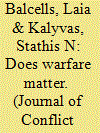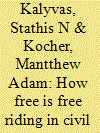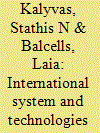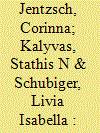|
|
|
Sort Order |
|
|
|
Items / Page
|
|
|
|
|
|
|
| Srl | Item |
| 1 |
ID:
134942


|
|
|
|
|
| Summary/Abstract |
Does it matter whether a civil war is fought as a conventional, irregular, or symmetric nonconventional conflict? Put differently, do “technologies of rebellion” impact a war’s severity, duration, or outcome? Our answer is positive. We find that irregular conflicts last significantly longer than all other types of conflict, while conventional ones tend to be more severe in terms of battlefield lethality. Irregular conflicts generate greater civilian victimization and tend to be won by incumbents, while conventional ones are more likely to end in rebel victories. Substantively, these findings help us make sense of how civil wars are changing: they are becoming shorter, deadlier on the battlefield, and more challenging for existing governments—but also more likely to end with some kind of settlement between governments and armed opposition. Theoretically, our findings support the idea of taking into account technologies of rebellion (capturing characteristics of conflicts that tend to be visible mostly at the micro level) when studying macro-level patterns of conflicts such as the severity, duration, and outcomes of civil wars; they also point to the specific contribution of irregular war to both state building and social change.
|
|
|
|
|
|
|
|
|
|
|
|
|
|
|
|
| 2 |
ID:
077447


|
|
|
|
|
| Publication |
2007.
|
| Summary/Abstract |
The conflict in Iraq has been portrayed as "ethnic" civil war, a radically different conflict from "ideological" wars such as Vietnam. We argue that such an assessment is misleading, as is its theoretical foundation, which we call the "ethnic war model." Neither Iraq nor Vietnam conforms to the ethnic war model's predictions. The sectarian conflict between Shia and Sunni militias is not simply the outcome of sectarian cleavages in Iraqi society, but to an important extent, a legacy of U.S. occupation. On the other hand, although Vietnam was a society riven by ethnic cleavages, the Vietnam War also fails to conform to the ethnic war model. We show that there is no necessary overlap between ethnic conflict and ethnic war. Some ethnic conflicts evolve into ethnic wars, and others develop dynamics virtually indistinguishable from those of ideological civil wars. We suggest that the state's role is essential in transforming conflicts into either ethnic or irregular wars. We conclude with an analysis of the current situation and future prospects in Iraq
|
|
|
|
|
|
|
|
|
|
|
|
|
|
|
|
| 3 |
ID:
142494


|
|
|
|
|
| Summary/Abstract |
Large-scale organized crime occupies a gray zone between ordinary crime and political violence. The unprecedented scale of drug-related crime in Mexico has led to its description as an insurgency or even a civil war, a conceptual move that draws on recent studies that have associated civil war with large-scale criminality. By questioning both the “crime as civil war” and “civil war as crime” models, I argue that instead of folding the two phenomena, we should draw primarily from the micro-dynamics of civil war research program to identify areas of potentially productive cross-fertilization. I point to four such areas, namely, onset and termination, organization, combat and violence, and governance and territory. I conclude by sketching a theoretical and empirical agenda for the study of large-scale organized crime.
|
|
|
|
|
|
|
|
|
|
|
|
|
|
|
|
| 4 |
ID:
078471


|
|
|
| 5 |
ID:
100763


|
|
|
|
|
| Publication |
2010.
|
| Summary/Abstract |
Because they are chiefly domestic conflicts, civil wars have been studied primarily from a perspective stressing domestic factors. We ask, instead, whether (and how) the international system shapes civil wars; we find that it does shape the way in which they are fought-their "technology of rebellion." After disaggregating civil wars into irregular wars (or insurgencies), conventional wars, and symmetric nonconventional wars, we report a striking decline of irregular wars following the end of the Cold War, a remarkable transformation of internal conflict. Our analysis brings the international system back into the study of internal conflict. It specifies the connection between system polarity and the Cold War on the one hand and domestic warfare on the other hand. It also demonstrates that irregular war is not the paradigmatic mode of civil war as widely believed, but rather is closely associated with the structural characteristics of the Cold War.
|
|
|
|
|
|
|
|
|
|
|
|
|
|
|
|
| 6 |
ID:
158450


|
|
|
|
|
| Summary/Abstract |
In this essay, I decouple violent jihadism from both religion and terrorism and propose an alternative, nonexclusive understanding of jihadi groups as rebel groups engaged in civil wars. Arguing that jihadi groups can be profitably approached as the current species of revolutionary insurgents, I offer a comparison with an older species, the Marxist rebels of the Cold War. I point to a few significant similarities and differences between these two types of revolutionary rebels and draw some key implications, stressing the great challenges facing jihadi rebels in civil wars.
|
|
|
|
|
|
|
|
|
|
|
|
|
|
|
|
| 7 |
ID:
114678


|
|
|
|
|
| Publication |
2012.
|
| Summary/Abstract |
The article reviews recent advances in the study of violence in civil wars. It provides a brief description of the baseline "control-collaboration" model, discusses alternatives to it, and reviews recent empirical studies that supply additions, corrections, extensions, and refinements to the baseline model. It highlights some of the assumptions that can be relaxed based on this new research, including the following ones: that in civil war context information is produced exclusively or even primarily by civilian denunciations at the local level; that violence is only used to deter civilian defection; that conflict is always locally dyadic; and that rival factions are organizationally indistinct from each other and resort to similar repertoires of violence. These refinements and extensions have the potential to produce a novel set of predictions that can be tested against both existing and new data. The essay notes the dynamism of this research program and recommends two steps for future research. First, it recommends moving to a higher-level, empirical and theoretical synthesis, by relying on the growing corpus of empirical studies and exploring scope conditions in a much more systematic way than was possible previously. Second, it recommends scaling up the findings of micro-level, subnational studies to the meso and macro-levels, by deriving novel empirical implications and testing them.
|
|
|
|
|
|
|
|
|
|
|
|
|
|
|
|
| 8 |
ID:
141179


|
|
|
|
|
| Summary/Abstract |
Militias are an empirical phenomenon that has been overlooked by current research on civil war. Yet, it is a phenomenon that is crucial for understanding political violence, civil war, post-conflict politics, and authoritarianism. Militias or paramilitaries are armed groups that operate alongside regular security forces or work independently of the state to shield the local population from insurgents. We review existing uses of the term, explore the range of empirical manifestations of militias, and highlight recent findings, including those supplied by the articles in this special issue. We focus on areas where the recognition of the importance of militias challenges and complements current theories of civil war. We conclude by introducing a research agenda advocating the integrated study of militias and rebel groups.
|
|
|
|
|
|
|
|
|
|
|
|
|
|
|
|
|
|
|
|
|